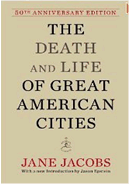

 |  |
Death and Life of American Cities
|
Please go to the new Coffee Coaster site implemented more gracefully in Wordpress. Full conversion by 9/12. This page: http://brianrwright.com/CoffeeCoasterBlog/?p=952 |
 This exceptional book was highly touted by Ayn Rand's coterie of intellectuals back in the day of The Objectivist Newsletter (early 1960s). Jane Jacobs came along in the same era—Death and Life of Great American Cities (Cities) was published in 1961—which was also the heyday of the Great Society programs, where good intentions and city planning could do no wrong.
This exceptional book was highly touted by Ayn Rand's coterie of intellectuals back in the day of The Objectivist Newsletter (early 1960s). Jane Jacobs came along in the same era—Death and Life of Great American Cities (Cities) was published in 1961—which was also the heyday of the Great Society programs, where good intentions and city planning could do no wrong.
Jacobs, a citizen-scholar of multiple subjects and a lifelong social activist for individuals and communities as they do and ought to live, devoted her life to truth above conventional practice or slavish obedience to authority. Cities is a tour de force of practical enlightenment: it's like The Way Things Work about cities... not the way they are supposed to work. More than anything, Jane Jacobs is a people person, as are her cities:
Planners do not seem to realize how high a ratio of adults is needed to rear children at incidental play. Nor do they seem to understand that spaces and equipment do not rear children....
It is folly to build cities in a way that wastes this normal, casual manpower for childrearing and either leaves this essential job too much undone—with terrible consequences—or makes it necessary to hire substitutes. The myth that playgrounds and grass and hired guards or supervisors are innately wholesome for children and that city streets, filled with ordinary people, are innately evil for children, boils down to a deep contempt for ordinary people. — page 82
Bingo. And one sees immediately from passage after passage like the above how sharp and wittily Ms. Jacobs slings her ink. The book is a pure joy to read; in a weaker writer's hands the recounting of neighborhood stories from Boston, Detroit, Philadelphia, New York, Los Angeles, Baltimore, Chicago, and so on would be utter tedium. When you're immersed in Cities, you want to strike out and land in the communities that work. It would be great to feel a part of something alive and spirited, yet one will only find districts or sections in these once-teaming, once-working cities that are not dying. Rather, as Ms. Jacobs puts it, "... the cities are not dying, they're being murdered (by the mindlessness, carelessness of city planners).
The paragraphs quoted above emphasize the human factor. This is the second time I have read the book, the first being in the 1970s while I was a student at an urban university, Wayne State in Detroit. What struck me originally about Cities were two things: a) the living cities (or parts remaining thereof) have been basically left alone to discover their own spontaneous order—consisting of highly diverse and plentiful populations with a common sensibility: looking out for one another in the normal course of pursuing one's own interests and b) the book and Jacobs became non grata in the leftist control culture (and its obedient younger counterculture of the time). In those days to question government planning for cities or urban 'removal,' as we young protolibertarians called it, was tantamount to shouting to the world that you hated the urban poor and black.
Sadly, Detroit was a laboratory of early failure of modern urban planning. You can point to the Ukrainian community and many other communities that were uprooted by one of the first expressways in the country, the Davison. Whether it was Baltimore, Philadelphia, or New York, I don't remember, but Jacobs captured the need for multiple casual, responsible strangers with eyes on the sidewalks 24/7. A spontaneous order occurs with healthful, natural development of a city: nonpredictable, just as one can never truly know what any free, economic system or subsystem will look like—who will be buyers, who sellers, who watchers.
Further, I was impressed back at that first reading how Jacobs showed the virtues of an Aristotelian objectivity and benevolent laissez-faire approach to human society over the Platonic "we (your city planners of government, your betters) know what's ideal and therefore what's good for you and therefore what you will be forced to have and to do" approach. Jane brings home in case after case how the Platonic Ideal combined with the bristling armament of Eminent Domain and Good Intentions kills. Actually, literally... by destroying any opportunity of safe habitat for real humans. The neighborhoods that remain or become healthy and thriving in big American cities are those left to their own devices, and Jane offers several in her era of the early 1960s.
What Jane, who was considered conventionally to be liberal, was offering was revolutionary in those days of the lionization of the Welfare State. Here was a liberal not only questioning urban planning and federal power (she would refer to it as a primarily a source of 'cataclysmic money'), but pleading with the government-power enabled liberals to quit killing her people in the cities—a haven for the last best hope of man on earth. She surely fell off the cocktail party invite list of the statist land-use establishment. Further, because of her anticentralist and antiwar views, my guess is the conservative-corporatist intellectuals of the time, represented by William Buckley and a handful of others, paid her no mind.
Leave it to the Ayn Rand coterie to bring Cities and Jane Jacobs to the liberty inclined. But the Rand group has always been ambivalent on central-government privileged corporations, reluctant to question, say, how General Motors conspired to destroy rational (privately funded) public transportation from roughly 1920 to 1960 in most American cities. If you read Jacobs bio, you understand how she fought the automobile mainly on the grounds of eminent domain takings from viable city neighborhoods. But Jane isn't stuck on the automobile as the central problem, rather it's the lack of diversity enabled in general by coercive systems:
... However, most city diversity is the creation of incredible numbers of differing ideas and purposes, planning, and contriving outside the formal framework of public action. The main responsibility of city planning and design should be to develop—insofar as public policy and action can do so—cities that are congenial places for this great range of unofficial plans, ideas, and opportunities to flourish, along with the flourishing of the public enterprises. City districts will be economically and socially congenial places for diversity to generate itself and reach its best potential if the districts possess good mixtures of primary uses, frequent streets, a close-grained mingling of different ages in their buildings, and a high concentration of people. — Page 242
The question I have, and I'm sure many others who are not knowledgeable of city planning or sociology, is whether Jane Jacobs was listened to at all. From the wholesale destruction of modern Western economies we're seeing today one might say no. But I suspect her ameliorative ideas did take root in many professional and public-spirited souls; it's simply the other engines of general statist devastation (GSD)—chiefly war and financial plunder—have masked the positive effect. It would be akin to a meteorite destroying the whole region containing a world-class botanical garden. The garden still had positive effect.
Read this classic. Because as we defeat the engines of GSD, an exciting New Paradigm will take hold in the cities of the West and the cities of the World... not to mention the solar system. Jane Jacobs will be a major seed of the human flowering. Plus her prose is sparkling and alive. You'll love her.
###
2011 September 25
©Brian Wright | The Coffee Coaster™
Jane Jacobs | Death and Life of Great American Cities | Urban Renewal
###
| Publish Fee: $25 Donation |  |
|||
Main | Columns | Movie Reviews | Book Reviews | Articles | Guest |